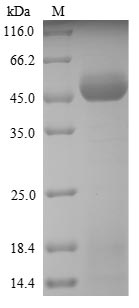Recombinant Ambrosia artemisiifolia Pectate lyase 5 is expressed in a yeast system and includes a full-length mature protein corresponding to amino acids 26-396. The protein is engineered with an N-terminal 6xHis tag, which makes purification and detection more straightforward. It shows purity greater than 90% as verified by SDS-PAGE, likely ensuring reliable performance for research applications.
Pectate lyase 5 from Ambrosia artemisiifolia is an enzyme involved in the breakdown of pectin, a major component of the plant cell wall. This protein appears to play a crucial role in plant tissue degradation and may be of interest in research focused on plant pathology and allergen studies, given the importance of its source species, short ragweed, in allergenic responses.
Potential Applications
Note: The applications listed below are based on what we know about this protein's biological functions, published research, and experience from experts in the field. However, we haven't fully tested all of these applications ourselves yet. We'd recommend running some preliminary tests first to make sure they work for your specific research goals.
Based on the provided information, recombinant Ambrosia artemisiifolia Pectate lyase 5 is produced in a yeast expression system as the full-length mature protein (26-396aa) with an N-terminal 6xHis-tag. Yeast expression systems provide eukaryotic folding machinery capable of supporting disulfide bond formation and some post-translational modifications, which are important for the structural integrity and function of enzymes like pectate lyase. The full-length nature of the protein increases the probability of correct folding. However, the N-terminal His-tag may potentially interfere with protein folding or enzymatic activity, particularly if the N-terminal region is critical for function. Purity >90% by SDS-PAGE is determined under denaturing conditions and does not confirm native folding or bioactivity. No validation data (e.g., enzymatic activity assays, circular dichroism) are provided. Therefore, while yeast expression suggests a reasonable chance of correct folding, the protein's folding status and bioactivity cannot be confirmed without experimental validation.
1. Enzyme Kinetics and Biochemical Characterization Studies
Pectate lyase activity depends on precise folding and active site formation; misfolding would render kinetic data biologically irrelevant. If correctly folded, this recombinant pectate lyase 5 can be used to study enzymatic properties such as substrate specificity and kinetic parameters using pectate substrates. However, if misfolded, enzymatic assays would yield invalid results, as the active site may be disrupted. The His-tag might also affect enzyme activity or substrate binding, so validation of activity is essential before quantitative studies.
2. Comparative Enzyme Evolution and Structure-Function Analysis
Comparative analyses require native folding to ensure valid insights into enzyme evolution and function. If properly folded, the protein is suitable for comparative studies with pectate lyases from other species to understand evolutionary adaptations. However, if misfolded, any structural or functional comparisons would be misleading, as the data would not represent the native protein. The His-tag should be considered when interpreting structural data, as it may influence biophysical measurements.
3. His-Tag Affinity Purification and Protein Interaction Studies
Protein-protein interactions depend on native conformation; misfolding compromises binding specificity. The His-tag facilitates purification and can be used for pull-down assays to identify interaction partners, such as cell wall components. However, if the protein is misfolded, interaction domains may be altered, leading to non-specific binding or failure to recognize genuine partners. Even if folded, the tag might sterically hinder some interactions.
4. Antibody Development and Immunological Research
Antibodies can be generated against linear sequences, but conformational epitopes may be misrepresented if the protein is misfolded. This application is suitable as antibody generation primarily relies on linear epitope recognition, which is independent of folding status. The high purity and full-length sequence support consistent antibody production. However, if misfolded, antibodies may not optimally recognize conformational epitopes of the native protein in biological contexts.
Final Recommendation & Action Plan
Before using this recombinant pectate lyase 5 in any functional application, it is essential to validate its folding and bioactivity through enzymatic assays (e.g., using pectate substrates to confirm activity) and biophysical methods (e.g., circular dichroism for secondary structure analysis); if validation confirms proper folding and function, proceed with applications while considering the potential impact of the His-tag on enzyme kinetics and interactions; if misfolded or inactive, consider using tag-free protein or alternative expression systems for better results; for immediate use, antibody development can proceed, but validate antibodies against native protein; always include appropriate controls (e.g., known active enzymes, substrate blanks) in experiments to ensure reliability.






